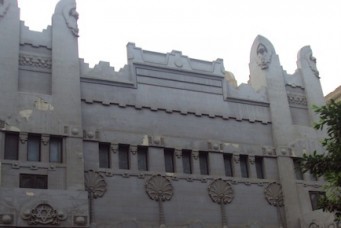Reactionary Satire In An Egyptian Zombie Flick
A recent zombie film illustrates how such pro-regime messaging is making its way into commercial entertainment; it satirizes Islamists and leftists and glorifies the military.
When MBC Misr cancelled Bassem Youssef’s El Bernameg in June 2014, it demonstrated that satire was not an effective cover for politically subversive themes. However, in Egypt today, satire is also being used to express ambiguity toward, or even disdain for, public challenges to the security state.
Ever since former President Mohamed Morsi’s ouster, the media has lambasted both Islamists and other activists, even amidst government killings and arrests. A recent zombie film illustrates how such pro-regime messaging is making its way into commercial entertainment; it satirizes Islamists and leftists and glorifies the military. By zombifying the Muslim Brotherhood in the wake of bloody government dispersals of pro-Morsi protest camps in the summer of 2013, the movie demands viewers to leave any sympathies or lingering doubts at the door.
El-Dassas (2014) is an Egyptian haunted house film in the genre of Scary Movie with clear political undertones. The director, Hany Hamdy, describes El-Dassas as the first Egyptian horror-comedysince the days of Ismail Yassin, an iconic comedian who appeared in films from the 1940s to the 1970s. It depicts the Muslim Brotherhood as zombies aligned with the April 6 movement (they rise from the dead on that date every year). In the film, four trivialized and belittled representatives of Egyptian youth are recruited by text message to participate in a reality show in which they have to spend the night in an abandoned house (haunted, of course). Locked in for the night, the characters learn the identity of the demonic owner—Hassan El-Dassas, a parody of Muslim Brotherhood founderHassan Al-Banna. Dropping limbs and drooling blood, the zombies paw at the contestants. Hurled together, they learn they are blood relatives, decedents of a military officer murdered by El-Dassas. With the help of the police officer brother of the only female contestant, the youths defeat El-Dassas. The people and the police unite, and together save the day as they realize their common military heritage.
In Egypt over the past year, debates about censorship have often happened in public view. Aggrieved artists and producers appear on talk shows to accuse the censors of inappropriately cutting or postponing the release of their work, and censorship officials frequently respond live on air. The makers of El-Dassasemployed this tactic, perhaps using the censorship process as a publicity stunt. However, while defending the appropriateness of their own work, they have argued against broad freedom of expression and in favor of strong government control. They called for censors to only approve work that is morally, artistically, and politically pure, as if the three are clear-cut criteria that can go hand-in-hand.
In April 2014, the makers of El-Dassas went on a media campaign when the censors delayed releasing the film, under then head of censorship, Ahmed Awad. They accused the censors of stalling the release of their film because the censors wanted to weaken the film’s political message. Additionally, they complained that the censors were politically suspect and not cultured enough to appreciate artistic value or discern what content is dangerous to the public. On talk shows (here and here) and on a Facebook page, they focused on Awad. They accused him of playing into Islamists’ hands, and of being unqualified to serve as chief censor, given his work as a director of commercial films purportedly of low artistic value.
When the Prime Minister, Ibrahim Mehleb, went over Awad’s head on April 16 to ban the film Halawet Roh (Sweetness of Spirit) starring Lebanese bombshell Haifa Wahabi, the El-Dassas Facebook page applauded this decision. The sit-in announced on the El-Dassas Facebook page called to save the public from morally dangerous material and from work of low artistic value. Rather than defending their own film by calling for less censorship, the administrators of the El Dassas Facebook page called for purging the censorship office to bring it in line with their own political and moral standards. They cheered Awad’s resignation on April 18 following the controversy over Halawet Roh. A few weeks later, the new head of censorship, Abdul Sattar Fathi, gave final approval for El-Dassas’ commercial release.
Political satire is often portrayed as inherently liberating and subversive towards the powerful and their institutions. However, the case of El-Dassas illustrates how satire can sometimes express pro-regime messages. El-Dassas is an example of how callousness over security crackdowns is making its way into mass media comedy and fictionalized narratives about political conflict. Political comedy may be inherently transgressive, but it can embrace oppression as well as revolt against it. Satire is not always revolutionary.
Meir R. Walters is a doctoral candidate in the Department of Government at Georgetown University. From 2012 to 2013, he was a Fulbright fellow in Egypt and a fellow at the Center for Arabic Study Abroad at the American University in Cairo.
Subscribe to Our Newsletter




